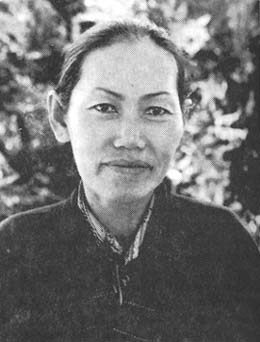|
When Kuo Gao first came to
America, she could not find a temple to go to
and felt a great sense of loss. Shortly,
though, she learned of a newly established
Vietnamese Temple and joyfully began to
attend. The Temple was in the heart of Los
Angeles, however, and Kuo Gao kept having the
feeling that she wanted to cultivate in a
"quiet place," a jungle, perhaps.
But America was too cold for jungles. She also
could not forget the 'old Chinese monk' who
had come to Saigon in 1973. But America was
so big and she did not know where to look to
find him.
In May of 1977, Kuo Gao learned
that there were two young monks bowing
once every three steps. Immediately she
wondered if these were disciples of the
'Venerable Abbot.' She went to pay her
respects and when she saw them from afar she began
crying as she thought. "Why don't
living beings cultivate? They don't know they
have a 'good diamond inside.' Because
they don't know to cultivate, these monks
have come to represent them in bowing for a11
our offenses. They are truly Bodhisattvas
who have forgotten about themselves."
She bowed to them and made an offering.
"Why did you do that?"
asked the person who had accompanied her.
"You could save that and make an offering at
temple tomorrow."
"How do I know I will live
until tomorrow? I can't wait unfit tomorrow.
When I see someone realty cultivating, I
want to do what I can to support them.
Tomorrow may never come." was Kuo Gao's
reply.
Shortly after that encounter, Kuo
Gao met the Abbot at Gold Wheel
Temple and soon became a disciple and took the
Five Precepts. From the moment she saw him, she
knew he was 'a good monk.' She began to
attend Gold Wheel Temple regularly, helping
out in whatever way was needed. Later she
went to the city of Ten Thousand Buddhas to
receive the Bodhisattva Precepts. Hearing the
big bell, memories of temples in the
distant past flooded over her and as she
walked through the quiet of the City's wooded
grounds, she realized that this was the
'quiet place' she had been searching for. After a
week's stay she returned to her family, and
realized with a slight sense of fear, that
although she had taken the Bodhisattva
Precepts, she was not sure what they all said and
wished to be able to study them. By way of
response, a Vietnamese friend gave her a
volume of the Bodhisattva Precepts in
Vietnamese and she has recited them bi-monthly
ever since. Kuo Gao went to listen to the
Dharma at Gold Wheel every month when the Abbot
came to lecture, and continued to protect
and support that temple.
As the time for the Opening of
the Light on Kuan Yin Bodhisattva at
the City of Ten Thousand Buddhas
approached in 1979, Kuo Gao made her plans to go to
the City. But about three weeks before the
time, her husband fell i11. She did not
know how seriously i11 he was until his
pneumonia had advanced to the fatal stage.
When she finally got him to the
hospital there was another full day's wait
in the emergency room while tests were
taken and results read. When asked his
religion, her husband said "none,"
but added, "my wife's a Buddhist." "My
husband is practically dead and you let him lay here
without any treatment for a whole day. If you
are not going to take care of him, I will take him home and care for him
myself."
"You speak very
straight," replied the doctors, "We have been
running tests -- that caused the delay. Let's take
your husband to intensive care now and
care for him together, alright?" She knew
that the doctor did not expect her husband to
live.
As the doctor wheeled her husband
into the hospital room, Kuo Gao did
not accompany them. Instead she found a
place to sit and began to recite Kuan Yin
Bodhisattva's name and to appeal to the
Venerable Abbot alternately. Her vigil did not
cease nor her sincerity wane for an entire
day and night. For three days none of the
professional people thought her husband
would live. His face was blue, his
throat blocked, his lungs full, and his
heart weak. After three days he was out of
critical condition. The fourth day he woke
up, not remembering anything that had
transpired since his arrival at the
hospital.
At the end of a week he was out of
intensive care and into a regular hospital
ward. The nurse on duty said, "We all
thought you would go "down" and you went
"up" instead. We don't know how you went
"up."
Kuo Gao whispered to her husband,
"Kuan Yin helped you," and her
husband immediately turned to the nurse and said
emphatically, "Kuan Yin helped me,"
and from that day on, he always recites the name of
Kuan Yin Bodisattva before he goes to sleep
each night. "I'll never forget," he
tells Kuo Gao gruffly. In two weeks her husband was
released to go home.
But the opening came before he
left the hospital and Kuo Gao was
determined to go. So she walked out of the hospital
one day, straight to the bus station and
took a bus to the City. One brief day was
all she dared spend, but during that day
she looked around at the hundreds of people
attending the opening and thought to
herself, "You may all think it's easy to come
here, but it's not easy. If you don't have
good luck and good roots, you'll never be
able to get here."
|
